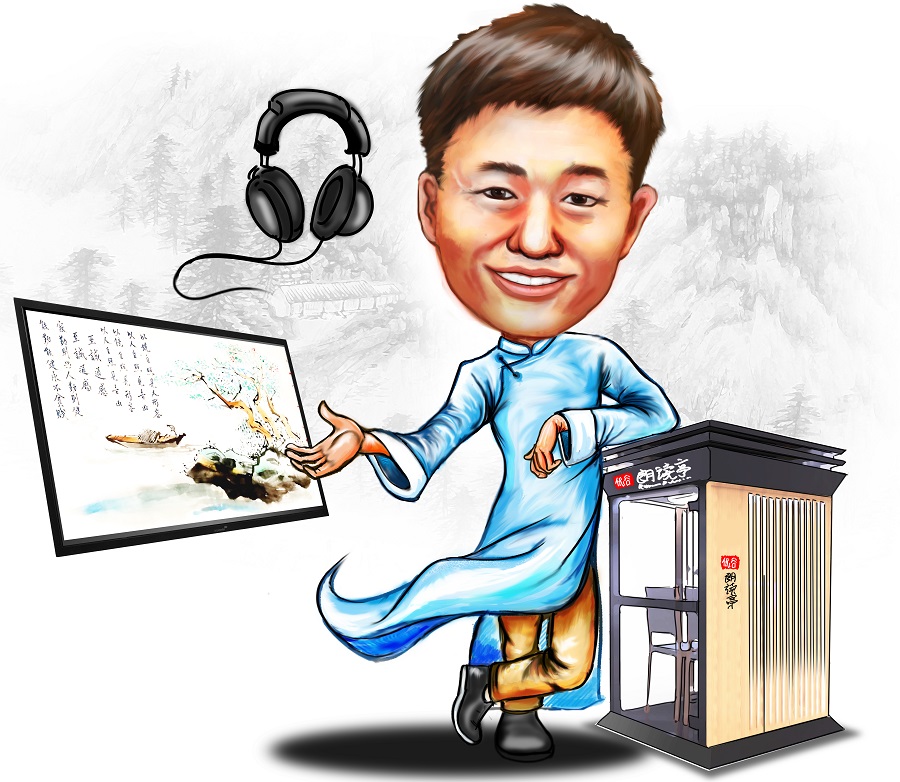How often haven’t you read aloud?


Reading out loud has regained its popularity on the Chinese mainland since TV show The Readers hit the small screen last year.
Airing on China Central Television, the show invites people from all walks of life to read aloud excerpts of poems or books they like or have written, and explain why a particular piece touched their hearts with stories from their own lives.
Poetic words with genuine sentiments have moved audiences even to tears and brought the almost-lost habit of reading aloud back to the public spotlight.
In September last year, a product specially designed for people to read aloud and record their voices was launched in the market. It looks like a public phone booth, but equipped with recording facilities inside.
Guangzhou Yougu Information Technology developed the product “Reading Pavilion”. So far, it has attracted more than 1 million users.
“I never expected it could draw the attention of so many people. It has become a way of expressing emotions and feelings,” says Lyu Quan, founder of Yougu.
On this year’s Mother’s Day, thousands of users went to the pavilions to record motherhood-related literature or even poems of their own composition as gifts to their mothers, he recalled.
The device allows one or two people to read in a quiet and isolated environment. The way it works is similar to karaoke but, instead of lyrics, on the screen are literature materials the users have chosen. Recordings can be uploaded online for sharing.
The product may look simple — just a booth with microphones and recorders in it — but Lyu found there’s an absence of professional recording facilities customized for human reading voices in such a small space.
Although there’re many mini KTV booths on the market, he believes recording one’s reading demands different devices than those used for recording singing, so he decided to develop their own facilities — from microphone, audio adapter to noise cancellation.
Lyu’s company has, so far, applied for more than 30 patents, 10 of which are for inventions.
As to software, the executive’s previous working experience in the digital publishing industry makes it convenient for the company to access resources. The budding firm has a long-term cooperation deal with several publishers for copyright and has teamed up with universities to help it pick the most beautiful masterpieces.
Lyu said Yougu has a database of over 30,000 reading materials, including poetry, children’s books, pieces of classic literature and foreign works. Each material is about two to three minutes.
A Second Farewell to Cambridge, a poem written by Chinese poet Xu Zhimo in 1928, has been read most often — 130,000 times — while The Furthest Distance in the World by Indian poet Rabindranath Tagore tops the foreign literature ranks.
As for Lyu, his personal favorite is the famous poem Nostalgia by Taiwan writer Yu Kwang-chung, which, he said, helps him relieve homesickness. Born and growing up in a poor family, the 34-year-old entrepreneur left his family for studies since primary school, making him crave for more time to accompany his parents.
The platform also provides resources in multiple languages, including German, French, Japanese and Spanish, so language learners can have a quiet place to practice pronunciation.
The learning function is the direction Lyu plans to push forward in future. “Language education is unbalanced in China. In some remote areas, teaching resources are not sufficient for learning Mandarin or English, and our product could be of assistance to local teachers,” Lyu says.
Therefore, his team is working on a standard reading demonstration and a system to review the accuracy of users’ reading. Last month, it released a new function of testing users’ oral English.
Lyu is optimistic the company’s revenue could exceed 50 million yuan ($7.3 million) this year.
Around 2,000 units of “Reading Pavilions” had been installed in libraries, schools and transportation hubs in about 200 cities across the country by the end of November, including the National Library of China in Beijing and Hangzhou’s Xiaoshan International Airport.
At Shenzhen Library, people often have to queue up to use the only “Reading Pavilion”.
But, Yougu is not the only player in the arena of innovative reading. At the 28th National Book Expo in Shenzhen in July, several smart book reading and listening booths developed by different companies were exhibited.
In the digital era, traditional publishers and bookstores are facing the challenge from the internet. Innovative ways to give full play to literature works are expected to create new opportunities for the industry.
However, one problem that bothers Lyu and other industry players is that the profit model of the smart reading box still needs to be further explored.
“Besides schools and libraries, we need to expand to commercial centers like shopping malls and private training facilities with a sustainable business model,” said Lyu.
Currently, organizations, mostly public ones, purchase the device and service, which are provided to users for free. But, in future, the startup may charge individual users a fee.
- Eight dead after minibus collision
- Chinese PLA navy to celebrate 75th founding anniversary with series of events
- Student detained on suspicion of the death of his roommate
- Smart teaching system launched for international Chinese learning
- Shanghai prepares to open parks 24 hours a day
- Action taken over Chongqing Gas Group overcharging



































